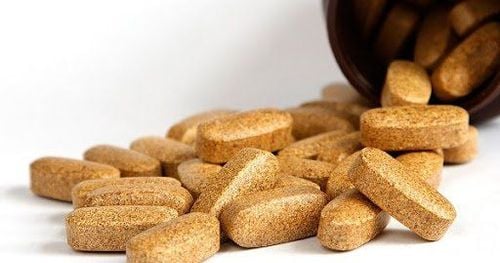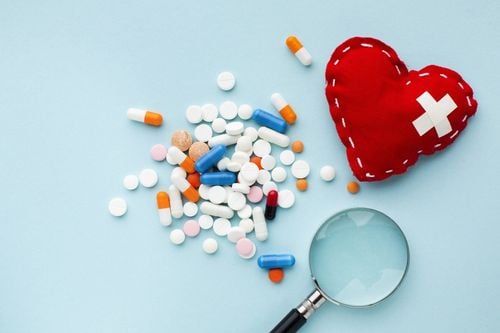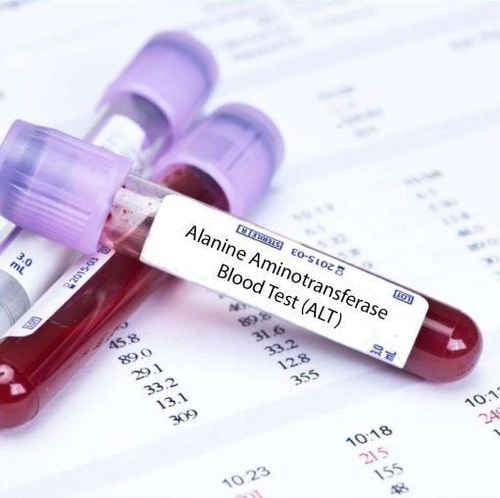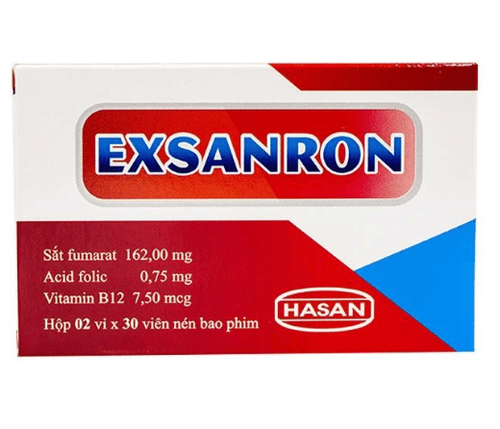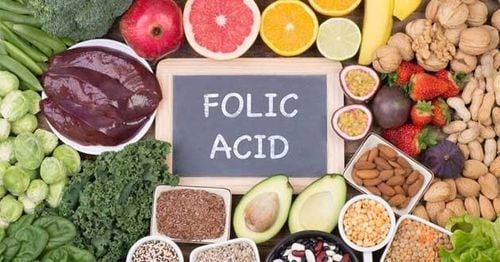This is an automatically translated article.
Vitamin deficiency anemia occurs when the body has lower than normal levels of the vitamin resulting in a lack of healthy red blood cells. Typical vitamins that lead to vitamin deficiency anemia include folate, vitamin B12, and vitamin C. Vitamin deficiencies can be caused by not eating enough or your body having trouble absorbing vitamins or processing food. Eating destroys these vitamins.1. Symptoms of vitamin deficiency anemia
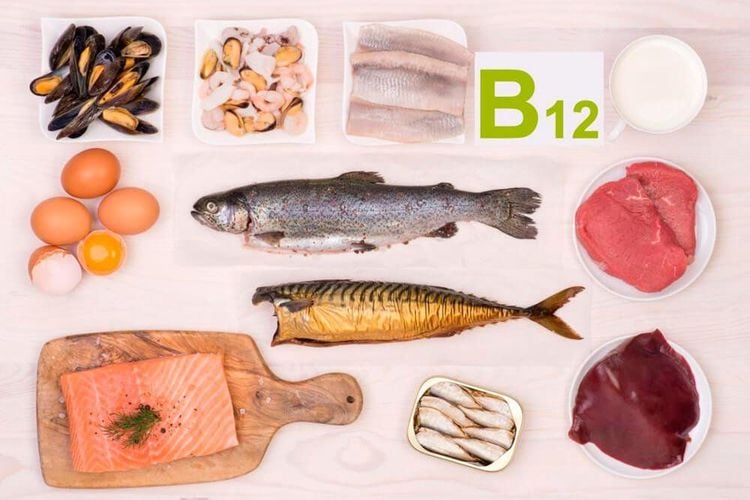
Vitamin B12 là thành phần có lợi cho máu
Signs and symptoms of vitamin deficiency anemia include:
Fatigue Shortness of breath Dizziness Pale or yellow skin Irregular heartbeat Weight loss Numbness or tingling in arms and legs Muscle weakness Personality changes Disorders Psychiatric Forgetfulness Signs of vitamin deficiency often develop slowly over several months to years, ranging from no symptoms to symptoms that are more difficult to detect and gradually increase as the vitamin deficiency worsens.
2. Causes of anemia due to vitamin deficiency
Causes of vitamin deficiency anemia include:
Folate deficiency anemia. Folate, also known as vitamin B9, is a nutrient found mainly in fruits and vegetables. If you eat a diet lacking in these foods, it can lead to folate deficiency and lead to anemia. The inability to absorb folate from food can also lead to a deficiency. Most nutrients from food are absorbed in the small intestine, however in people with conditions of the small intestine, such as celiac disease or those who have surgery to remove the small intestine, it can cause difficulty in absorption. absorb folate or its synthetic form, folic acid. Heavy drinking and use of certain anti-seizure medications reduce or interfere with folate absorption. Pregnant and lactating women have an increased need for folate due to the nutritional needs of the infant, which, combined with an inadequate response to the increased nutritional requirements of the mother, can lead to shortage. Anemia due to vitamin B12 deficiency. Vitamin B12 deficiency can be caused by a diet lacking in vitamin B12, which is found mainly in meat, eggs, and dairy. Also, anemia when your small intestine cannot absorb vitamin B12 due to causes such as stomach or small intestine surgery, abnormal bacteria growth in the small intestine, or diseases of the intestinal tract, such as Crohn's disease or celiac disease. interfere with vitamin absorption. Intrinsic factor is a protein secreted by the stomach that combines with vitamin B12 and travels to the small intestine to be absorbed. Without intrinsic factor, vitamin B12 cannot be absorbed and makes your body deficient in this vitamin. Intrinsic factor deficiency may be due to an autoimmune reaction in which your immune system mistakenly attacks the stomach cells that produce this factor. Vitamin C deficiency anemia is caused by not getting enough vitamin C from foods. Or due to other reasons that weaken the ability to absorb vitamin C such as smoking.
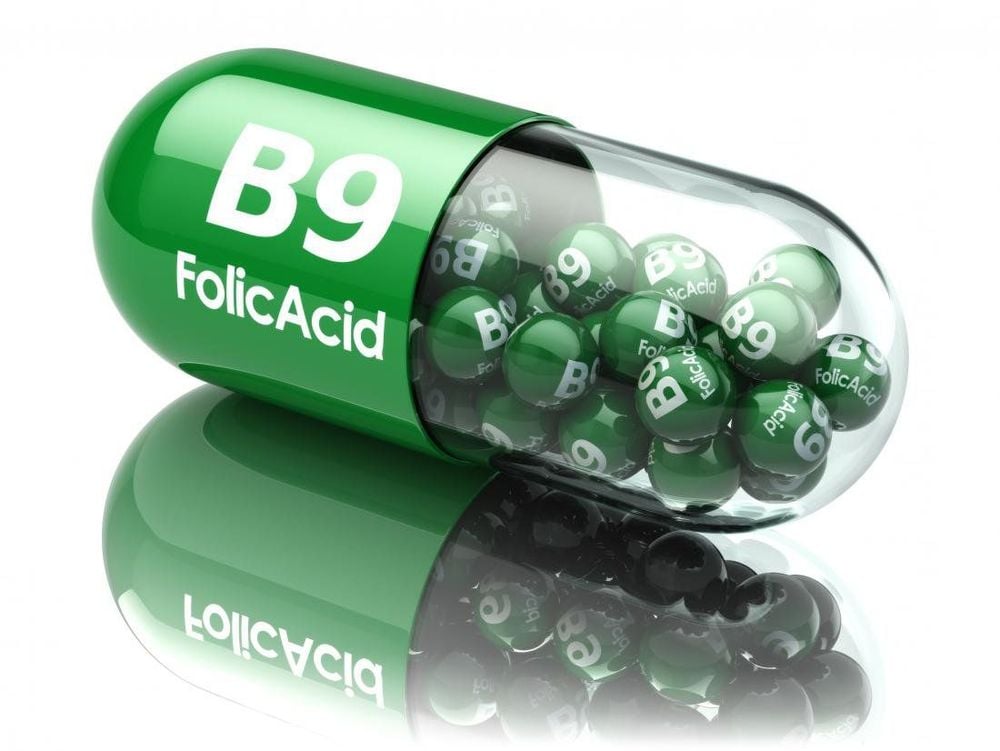
Thiếu hụt folate trong chế độ ăn uống dẫn đến nguy cơ thiếu máu
3. Risk factors
A number of factors can affect the body's vitamin stores, your risk of vitamin deficiency increases if:
Diet contains little or no foods containing natural vitamins, such as meat, dairy , fruits and vegetables. Vegetarians who don't consume dairy products, and vegans who don't eat any animal foods, can fall into this category. In addition, if you cook food too thoroughly, it can destroy vitamins. You are pregnant and not taking a multivitamin. You have intestinal problems or other illnesses that interfere with vitamin absorption. You abuse alcohol. Alcohol interferes with the absorption of folate and vitamin C, as well as other vitamins. You take certain prescription medications that can block the absorption of vitamins, such as anti-seizure medications that can block folate absorption or antacids, and some medications used to treat type II diabetes that can interfere with the absorption of vitamins. interfere with B-12 absorption. Risk factors for folate deficiency anemia include:
Hemodialysis in kidney failure Cancer treatment because certain drugs used to treat cancer interfere with folate metabolism.
4. Complications of anemia due to vitamin deficiency
Vitamin deficiency increases the risk of many health problems:
Pregnancy complications. Pregnant women with folate deficiency may be more susceptible to complications, such as premature birth. Nervous system disorders. Although vitamin B-12 is important for the production of red blood cells, it is also important for the nervous system. If left untreated, vitamin B-12 deficiency can lead to mental confusion and forgetfulness because vitamin B-12 is essential for the normal functioning of the brain. Scurvy is caused by a lack of vitamin C in daily foods. Signs and symptoms of this rare disease include bleeding under the skin and around the gums.

Biến chứng thiếu máu trong thời kì thai sản dễ có nguy cơ sinh non
5. Prevention
Choose a healthy diet
You can prevent some forms of vitamin deficiency anemia by choosing a healthy and varied diet.
Foods rich in folate include:
Dark green vegetables Nuts Grain products, such as breads, cereals, pasta and rice Fruits and fruit juices Foods rich in vitamin B-12 include:
Eggs Foods rich in vitamin B-12 like cereals Milk, cheese and yogurt Red meat, white meat and shellfish Foods rich in vitamin C include:
Broccoli Fresh fruit and juice Strawberries Sweet peppers Tomatoes The daily amount of vitamins needed by an adult is as follows:
Vitamin B-12: 2.4 micrograms (mcg) Folate or folic acid: 400 mcg Vitamin C: 75 to 90 milligrams Pregnant and breastfeeding women Breastfeeding babies may need more of these vitamins.
Consider taking a vitamin supplement
Most people get enough vitamins from food but if your diet is limited you can take a multivitamin under the guidance of your doctor.
Don't smoke
Smoking interferes with the absorption of nutrients so if you smoke, quit smoking. If you don't smoke, don't ever smoke, even if it's just a test smoke.
Drink alcohol in moderation
Because alcohol can contribute to vitamin deficiency anemia, if you do drink it, it should be in the following recommended amounts:
Two drinks/day for men 65 years and younger One drink/day for men over 65 One drink/day for women of all ages One drink counts as follows: 355 ml of beer, 148 ml of wine or 44 ml of spirits.
It can be seen that vitamins play an extremely important role in our health. Therefore, pay attention to your diet and activities to get good health and minimize the risk of disease.
Please dial HOTLINE for more information or register for an appointment HERE. Download MyVinmec app to make appointments faster and to manage your bookings easily.
Articles refer to sources: mayoclinic.org, webmd.com




